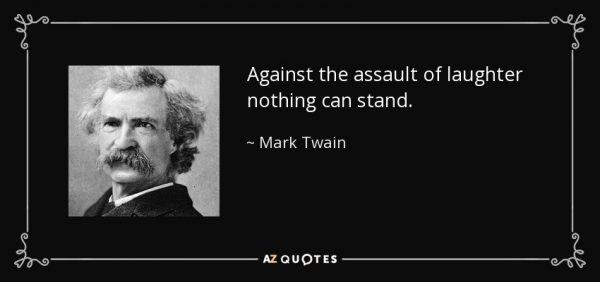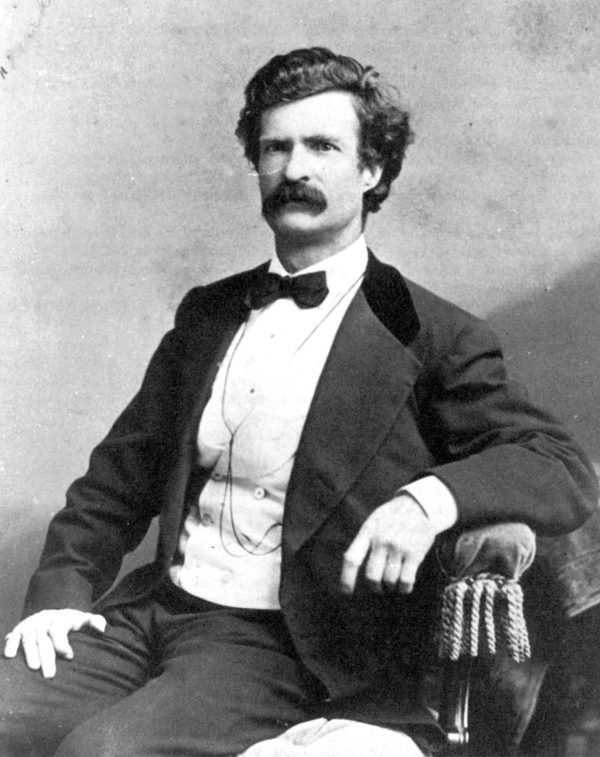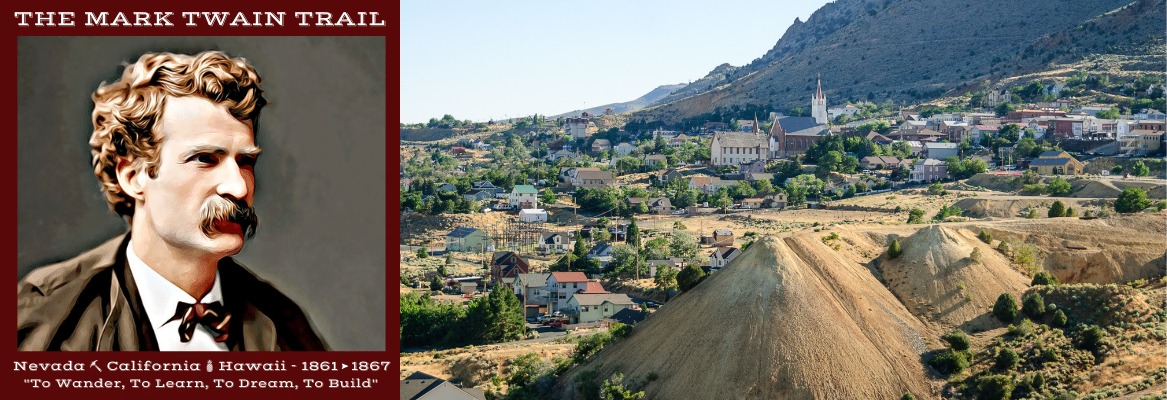What cannot ever be forgotten about Mark Twain was that he was always looking for something in his writing and words that would make people laugh. Twain knew that laughter was one of the most powerful forces on Earth, and this Twain quote exemplified the power of laughter —–>

A letter written by Mark Twain from Virginia City, Nevada on July 12, 1863 when he was working for the San Francisco Daily Morning Call shows Twain’s funny-bone well and how well he can both insult folks while getting the same folks to laugh, at themselves and others.

The San Francisco Daily Morning Call, July 15, 1863
MARK TWAIN’S LETTER
(From Our Regular Correspondent.)
VIRGINIA CITY, N.T., July 12, 1863
Editors Morning Call: – Last week the weather was passably cool here, but it has moderated a good deal since then. The thermometer stands at a thousand, in the shade, to-day. It will probably go to a million before night. But the evenings are as cool and balmy as a shroud – wherefore, we refrain from grumbling. The weather took a curious freak yesterday: it actually clouded up and rained for five minutes – the first time such a thing has occurred here within my recollection. Several of the drops were assayed at once, of course, and found to be genuine; but they contained neither gold nor silver. Had the storm lasted an hour, it would have been incorporated under the Territorial law.
The races over the Winters course at Washoe City have commanded a good deal of interest during the past week. Marcus D. Boruck, editor of the San Francisco Spirit of the Times, attended them, for the purpose of reporting the proceedings for his paper. So far, Joe Winters’ Miami is the winning horse. The race yesterday was two mile heats, best three in five, and the competitors Miami, Strideaway and Kate Mitchell. Miami won, in three straight heats. Time: 1:53, 1:54, 1:55. To-morrow finishes the season.
A mass meeting was held at Maguire’s Opera House this afternoon, for the purpose of raising a Sanitary Fund for the relief of soldiers wounded in the recent great battles in Pennsylvania and at Vicksburg. The enterprise was so insufficiently advertised that the theatre was not more than half full, and I was a little disappointed in the sum collected. They could have done about half as well in any other town of the same population, and I dislike to see Virginia fail to go ahead of all similar cities. Not more than a dozen or so of our wealthy me were present, and none of our great men were represented by authority. However, the meeting was very enthusiastic. Mr. R. M. Daggett was elected President, and Wm. M. Stewart, Esq., set the ball in motion with a short, stirring speech, and a check for $500; Col. John A. Collins followed with a speech and another for $500; and in a few minutes about $6,000 was subscribed altogether. This is fourteen thousand dollars short of what ought to have been collected. However, we shall come out all right before the week is out. Committees will canvass the county for the next three days, and on Thursday evening the Sanitary Fund will take a benefit at Maguire’s Opera House; the free-list will be suspended, and the price of tickets placed at two or three dollars to all parts of the house. It will be a matter of small consequence what the play is – the theatre will be packed to its utmost capacity. Between the acts the audience will be permitted to subscribe to the fund, whether they want to or not. Mr. Paul proposed, to-day, that inasmuch as our former donations had gone to the New York and Cincinnati commissions, we now raise $20,000, cast in into a huge silver block, inscribe “Vicksburg” upon it, and send it to St. Louis. The idea is sound.
Three of the Pioneer coaches met with accidents day before yesterday, this side of Placerville. One of them rolled down a slight precipice, and was smashed to pieces. Mr. Teschemacher, of San Francisco, was in it, but escaped uninjured. Mr. F. T. Moss had three ribs broken, and Mr.G. T. Sewall, of Humboldt District, received a small bruise or so. Mr. Sewall is the profound Justice of the Peace who held an inquest last Fall at Gravelly Ford, on the Humboldt River, on a petrified man, who had been sitting there, cemented to the bed-rock, for the last three or four hundred years. The citizens wished to blast him out and bury him, but Judge S. refused to allow the sacrilege to be committed.
I have been around among mines this week. The Savage company are keeping five mills going, and shipping bullion every day. I descended the main shaft of the Hale & Norcross, three hundred feet, and found they had not yet struck the ledge in the lower level, and will not for the next five or six days. The Chollar company are putting up the finest and most extensive pumping and hoisting machinery in the Territory. They are shipping bullion regularly, and will increase the quantity vastly as soon as their new works are completed, say eight weeks hence. The Potosi company are also erecting hoisting machinery at the C street shaft. The Virginia Rogers Company are at work again, they tell me. I went all through the Ophir, too, through the extensive excavations in the “north mine,” and thence under the Spanish, by way of the “fifth gallery,” to the “south mine,” in this portion of the mine the Company are drifting south on the ledge to find the rich streak of ore lately struck in the Central – they have about fifty fee to drift yet. The yield of the Ophir – in the Company’s own mills – was nearly $200,000 last month. The Gould & Curry mine doubled this yield, perhaps, but the rock was worked in many mills other than their own. The Silver City mines are coming out handsomely, and are growing in favor every day. Those of Gold Hill are being worked with increased energy and profit, and new machinery of an expensive character has been added to several of them lately. The Echo Company are making preparations to sink a new shaft in the vicinity of the Succor Mill, as it is dangerous to work the old incline, on account of its caving propensities. The last batch of rock from the Echo – thirty tons, third-class – yielded seventy-one dollars to the ton in the Pioneer Mill. The first-class ore goes clear out of sight into the thousands. The Echo is probably the riches mine in Gold Hill District. Work on the Yellow Jacket and Belcher is progressing as usual, and the stock continues to advance in price. Two months hence will see these mines pretty thoroughly opened, and prove them, doubtless, to be among the best in Washoe.
The Humboldt Register man has taken umbrage at something I said in my last letter – about the day of excitements in Humboldt being over – the people having gone soberly to work, and left that sort of thing to newer districts. He says Humboldt never dealt in excitements. Now, in my opinion – however, on second thought I will not discuss this matter with that editor. I can “lam” him.
I will conclude by hashing up a little general news for you:
Dispatches from Salt Lake say that Judge Mott, of this District, is there, on his way to Virginia.
The Hoosier State Mill, between here and Gold Hill, was sold by Messrs. Blasdell & Pray, a day or two since, to Messrs. George Hurst and Jake Clark, for forty thousand dollars, cash. It is an excellent little eight stamp mill, and worth the money.
A billiard tournament came off here during the week, between two of your most distinguished players, A. W. Jamieson and J. W. Little. The game (five hundred points,) was played on a carom table, and Jamieson won it, beating his competitor one hundred and seven. Mr. Jamieson has not his superior on the Pacific coast.
In the theatrical line, we are to have a complimentary benefit to Mr. and Mrs. Chas. Pope next Wednesday evening at the Court House, and about Tuesday evening that sickest of all sentimental drama, “East Lynne,” will be turned loose upon us at the Opera House. It used to afford me much solid comfort to see those San Franciscans whine and snuffle and slobber all over themselves at Maguire’s Theatre, when the consumptive “William” was in the act of “handing in his checks,” as it were, according to the regular programme of East Lynne – and now I am to enjoy a season of happiness again, I suppose. If the tears flow as freely here as I count upon, water privileges will be cheap in Virginia next week. However, Mrs. Julia Dean Hayne don’t “take on” in the piece like Miss Sophie Edwin; wherefore, she fails to pump an audience dry, like the latter.
Now, from the sentimental to the practical: The big chimney at the Could & Curry mill is finished at last. It is one hundred and fifteen feet high, and handsomely based and capped with cut stone.
I forgot to say that Maguire’s new opera house here is a little larger and rather handsomer than its counterpart in San Francisco, and is crowded seven nights in the week.
MARK TWAIN.
